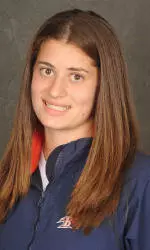
Bucknell Women's Rowing Journal - Emily Ralen
4/5/2011 8:00:00 AM | Women's Rowing
April 5, 2011
I believe all rowers are faced with a similar problem when asked by people outside the sport why they row. We all know why we are here and we can come up with a general feeling or a few ideas to rattle off, but it is often difficult to put my finger on a specific reason. When you are practicing in frigid temperatures that coat your oars with ice or pain is pulsing through your body halfway through a race and the boat beside you isn't backing down, you have to dig deep for that feeling. It's a feeling that most people who haven't been in a boat will not understand. But most people are also not inspired by a team of more than 50 girls every day.
For me, this feeling has a lot to do with the group of rowers we call The Fours. I have had the opportunity to be a part of this group and have seen how its challenges push us to become better rowers and fill a unique place within the team. Every day I admire each of these girls for their drive and ability to "roll with the punches," as we like to say. Change is something that we embrace and have learned to excel in. We may find ourselves rowing in an eight for a few days, or switching from port to starboard, or even off the water on the erg. When a couple of rowers were off the water recently, I found that I was motivated by the thought of these girls doing the same workout inside, without all of their teammates around them. Even when I am sitting stroke seat and have only the orange and blue of the stern deck in front of me, I know they are all there supporting and pushing me. People tend to move in and out of our boats frequently, but each person is a critical part in developing some aspect of how we row together. Every rower is welcomed as we adapt to a new stroke, a new unit of four bodies flowing together. The fours test your ability to take whatever is thrown your way and still be the first to cross the finish line.
Coach Page tells us to expect the unexpected. She has taught us to take each practice and each race as something to add to our repertoire. After a piece at practice where our two fours clashed oars, something that can be stressful and disrupt focus, she told us that it could easily happen at our next race. So we took a breath and sat ready once again. Each obstacle or hard practice is one more thing we can manage on race day, one more thing pushing us ahead.
Race day finally came at the Murphy Cup, where we had a chance to test everything we had practiced and got a taste of our four's speed. In the varsity four heat, we flew off the start and quickly passed the boat next to us, soon walking the boat in lane three. We went back and forth with Navy in lane two, fighting them stroke for stroke as we took turns taking seats. One moment we would be moving up on them, the next moment they had gained a seat of open water as they responded to our power. In the end, it came down to the sprint, which we had not yet developed. We held onto them until those last few hundred meters. Navy took first place ahead of us by only a few seconds in the event, allowing them to progress to the finals. I was disappointed that we did not get a shot in the finals, but I also knew that it was a strong first race and we had only practiced in the lineup once. Each practice since then, our coxswain has used this as motivation. Do this better than Navy, she instructs us through the speakers. Be more focused; give more to this stroke than the other team. We will see Navy again at Patriots in a few short weeks and will be ready to `roll with' whatever they've got.
Being a part of this team has taught me that wherever you are, you can find this feeling - of unity, persistence and genuine love of the sport - and use it to drive you forward to make each stroke better than the last.
- Emily Ralen '12



